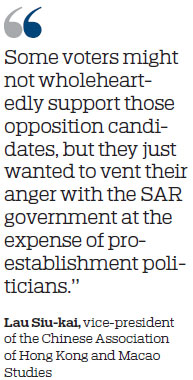'Protest vote' may hurt people's benefits: Analyst
Updated: 2019-11-26 07:58
By Li Bingcun and He Shusi in Hong Kong(HK Edition)
|
|||||||||
Most voters of the just-concluded District Council elections cast their votes out of dissatisfaction with the government, instead of making a rational decision, political analysts said on Monday, cautioning that voters may end up paying a price for that choice.
On Sunday, Hong Kong held its first election since protest violence erupted in mid-June. The city's opposition camp won a majority of the 452 District Council seats.
Lau Siu-kai, vice-president of the Chinese Association of Hong Kong and Macao Studies, said most voters, affected by the protracted social unrest, were driven by the political turmoil and failed to discharge their duties to bring benefits to the community.
The election results showed that many voters made the choice based only on the candidates' political backgrounds instead of their ability to serve the community, Lau said. This time, many pro-establishment candidates, despite their rich experience of participatory community work, were defeated by some political greenhorns in the opposition camp who were parachuted into the races.
For instance, pro-establishment lawmaker Horace Cheung Kwok-kwan, who sought re-election in the Sai Wan constituency, lost by 795 votes to opposition candidate Jordan Pang Ka-ho, a university junior.
In Lau's opinion, some voters might not wholeheartedly support those opposition candidates, but they just wanted to vent their anger with the SAR government at the expense of pro-establishment politicians.
He cautioned that such "protest vote" tactics may hurt the voters themselves, as some winning candidates, with little expertise and experience in serving the community, may fail to identify and serve their respective neighborhoods' needs. More importantly, they may prioritize political issues after assuming office, which may bring no good to livelihood improvement and fuel the ongoing unrest, he added.

Political commentator Paul Yeung told China Daily the results showed that political disputes, usually occurring in elections of high-level authorities, such as the government and legislature, are affecting more ordinary elections.
He stressed that according to the Basic Law, the city's district councils are not an organ of political power. Yet this year's election seems to have become a kind of "referendum" aiming to decide Hong Kong's future, which is not the purpose of its original set-up.
A veteran Hong Kong-based news editor told China Daily that besides political affinity, perhaps age affinity also played a role in this year's election, as young voters are more likely to vote for young candidates who hold similar views to them.
About one-tenth of the city's 4.1 million voters are newly registered since 2015. Of the total registered voters, about half of them are in the 18-35 age group. What's more, the election result showed that a large number of successful candidates are in the 18-40 age group.
Police action unaffected
Moreover, some in society worry that with the large number of opposition politicians elected, the police will face more challenges in their operations to stop violence in the city.
On Monday, Tang King-shing, former commissioner of the Hong Kong Police Force, said the result won't affect police efforts to restore order and bring offenders to justice.
Tang urged the newly elected councilors to cooperate with the SAR government and the police in their efforts to end the violence, rather than fanning the social unrest.
Contact the writers at bingcun@chinadailyhk.com
(HK Edition 11/26/2019 page4)